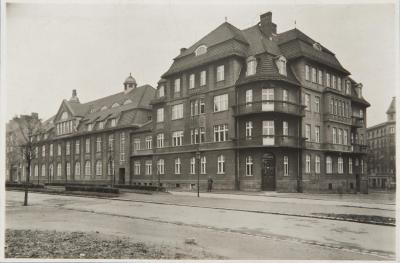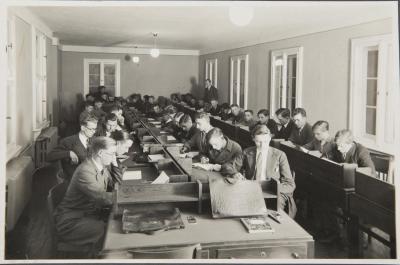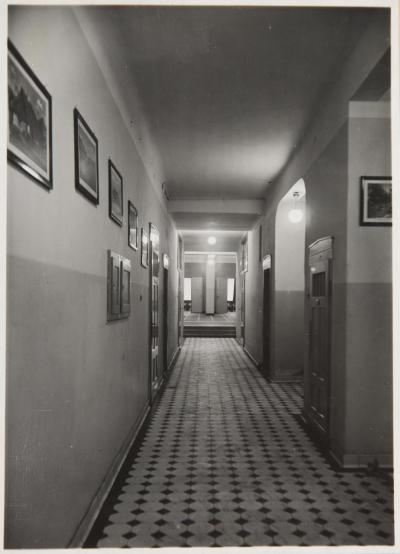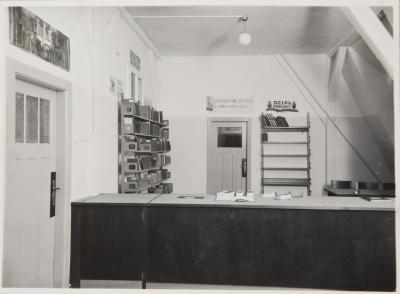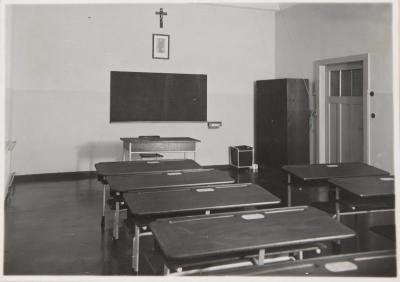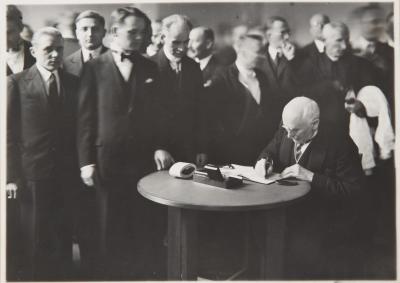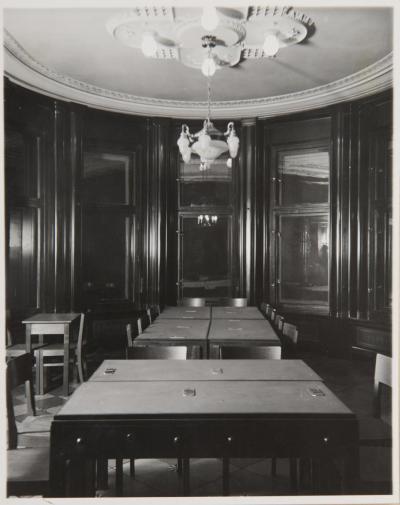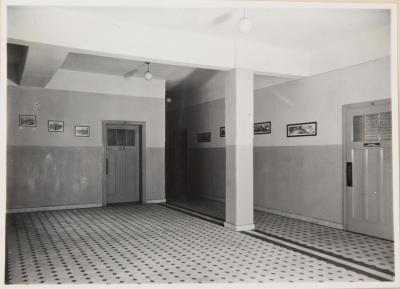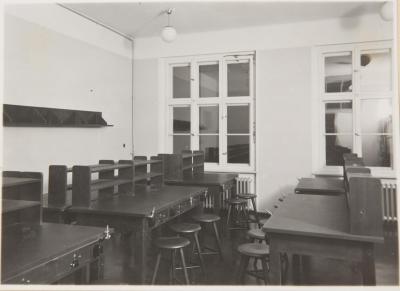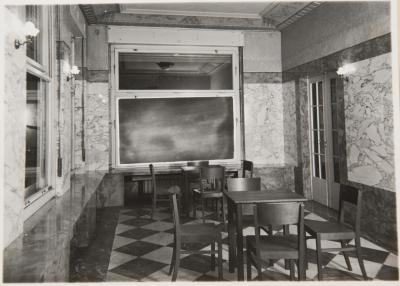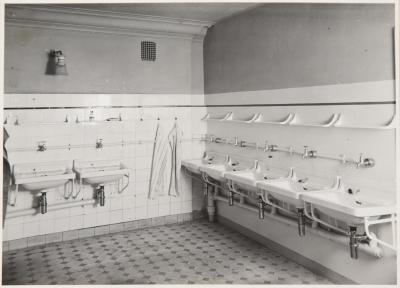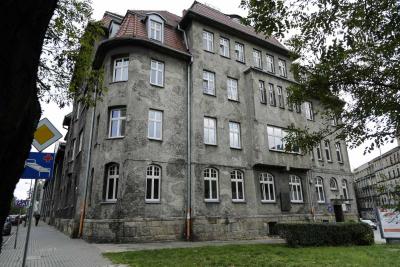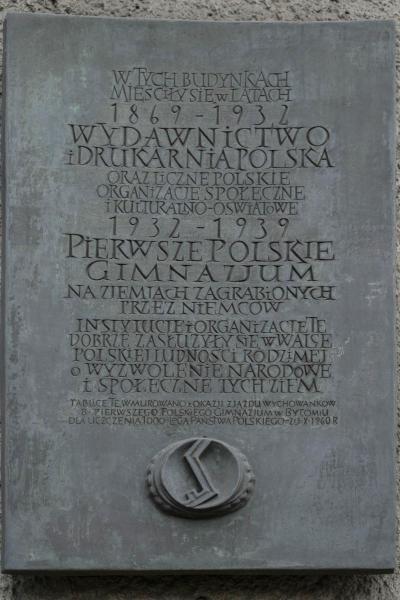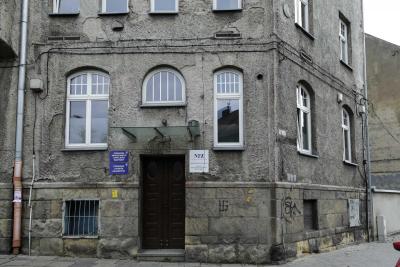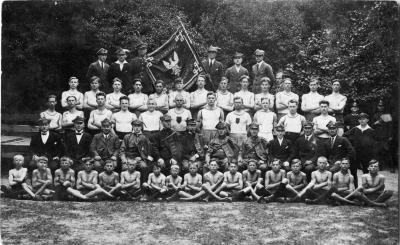The Polish grammar school in Bytom
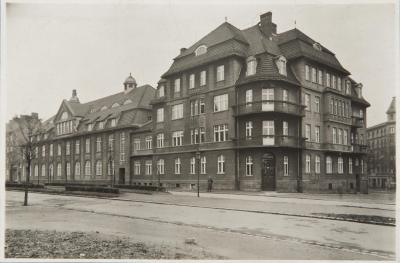
The school opening
The official opening of the Polish Grammar School took place on 8th November 1932. It began with a mass in the Church of the Holy Trinity attended by school students, their parents and teachers along with the headmaster, Wiktor Nechayem de Felseis and a large number of representatives from Polish districts. The festivities were also attended by the Chair of the Union of Poles in Germany, Pastor Bolesław Domański, the managing director of the Union, Jan Kaczmarek, the managing director of the Opole Section of the Union, Pastor Karol Koziołek, the Chair of the Union of Polish School Societies in Germany, Jan Baczewski, the Visitator of Polish Private Schools in Germany, privy counsellor Brasse, the Chair of the Union of Polish Co-operatives in Germany, Stefan Szczepaniak, and the Director of the Polish Catholic School Society in Opole, Jan Szreiber. The Polish government was represented by the Consul General in Opole, Leo Malhomme and the Polish Consul from Breslau, [Stefan Janusz] Bratkowski. Also present were the chair of the Mixed Commission, Felix Calonder, and the President of the International Court of Arbitration [for Upper Silesia], [Georges] Kaeckenbeeck. The Opole district government was represented by school counsellor, H. Schmikalla, and the municipal authorities in Bytom by school counsellor, Neumann.[11]
Felix Calonder gave a speech during the opening ceremony in which he underlined the reasons for opening the school and the ideas behind its work: “I am delighted to have accepted the courteous invitation to come to the opening ceremony in order to express my pleasure and delight that the Polish minority in Upper Silesia has finally succeeded in creating this private secondary school, the Polish Private Grammar School. This institution has an enormously important significance for the intellectual and cultural development of the Polish minority, but above all it will guarantee the education given by its enlightened leaders and staff. The newly founded Polish Grammar School deserves the sympathy not only of the Polish minority, but also of the German population, whose schoolchildren are also citizens of the German state. I am only too aware that my views are not shared everywhere. In Germany and in Poland there are voices time and again but mostly in the press, which point to the dangers of irredentists, who are allegedly hidden behind the efforts of the minorities, especially when it comes to trying to expand the school system for the minority.”[12]
The opening of the institution was followed with sharp interest by the local administration. In doing so they placed a variety of formal hurdles in the way; for example with reference to school students changing their school. The responsible bodies in the district government demanded a list of potential Grammar School students in order to present it to the Police President. The upshot was the creation of a well organised, politically motivated organisation to supervise the students and their parents. The spying activities were intended to put economic pressure on them and discriminate them in society. This often ended in the resignation of the parents who were interested in their child being educated at the Bytom school.[13]
Polish citizens were not the only persons to suffer from the trickery of the German administrative authorities. School students who belonged to the group of the Sorbs also found themselves in a similarly awkward position. In April 1937 they were forced by the authorities to leave the school, and 12 students were expelled. What remained was a collection of 300 books in the school library, the so-called Lausitz Library. It was originally donated to the Polish Grammar School by the Domowina, the Union of Lausitz Sorbs, represented by Jan Czyż, Jan Skałka and Michał Nawka.[14]
[11] BB, private estate, Sign. 140, „Ilustrowany Kuryer Codzienny” Nr. 313, dated 11.11.1932; „Nowiny Codzienne” Nr. 258, dated 10.11.1932; J. Lubos, Dzieje polskiego gimnazjum…, p. 40; W. Błońska, Działalność społeczno-pedagogiczna Gimnazjum Polskiego w Bytomiu (1932 – 1939), [in:] H. Andrzejczak, P. Obrączka (Hg), Z dziejów bytomskiej edukacji, Bytom 2005, p. 37.
[12] Muzeum Górnośląskie w Bytomiu (MGB) [Upper Silesian Museum in Bytom, shown in the following as MGB], Sign. H-896, Gimnazjum Polskie w Bytomiu. Sprawy różne [Polish Grammar School in Bytom, various], o.P. (Tuesday 8th November 1932 was the day of the opening of the Polish Grammar School in Bytom).
[13] APO, 1, Sign. 136, Bl. 121–123.
[14] E. Szwed, Wspomnienia z Polskiego Gimnazjum w Bytomiu, [in:] „Kwartalnik Opolski” 1960, No. 2.
